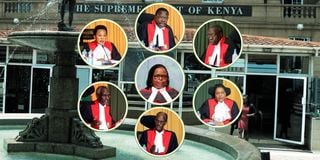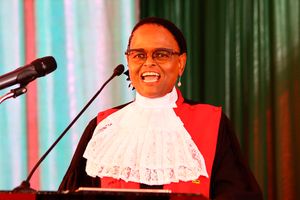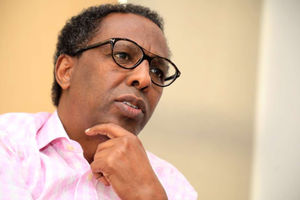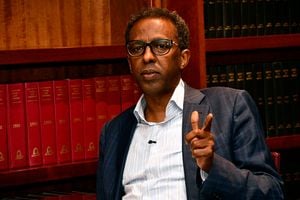
Chief Justice Martha Koome (center) and Supreme Court judges (top clockwise) Dr Smokin Wanjala, William Ouko, Njoki Ndung'u, Mohamed Ibrahim, Isaac Lenaola and Philomena Mwilu.
The Judicial Service Commission (JSC) is set to convene and discuss the elephant in the room: petitions for removal of judges following months-long attacks by a section of senior lawyers and litigants over alleged corruption in the corridors of justice.
Vice-chairperson Isaac Rutto on January 16 confirmed that since December, the JSC has received four petitions for the removal of nine judges, an indication that the cold war has reached boiling point and could have some casualties.
What started as social media-fuelled protests against alleged graft in one of Kenya’s most hallowed institutions, largely spearheaded by two former Law Society of Kenya Presidents – Ahmednasir Abdullahi and Nelson Havi – has snowballed into a push for removal of some of the country’s most senior judges.
In an unprecedented move, Mr Havi on January 13 filed a petition seeking the removal of all seven Supreme Court judges, including Chief Justice Martha Koome.
Mr Havi in his petition accuses the Supreme Court judges of alleged gross misconduct and misbehaviour. On January 16, JSC acknowledged receiving this petition and said it was processing it.

Supreme Court judges (from left) Isaac Lenaola, Dr Smokin Wanjala, Philomena Mwilu, Chief Justice Martha Koome, Mohamed Ibrahim, Njoki Ndung'u and William Ouko.
Mr Havi has also filed two other petitions, for the removal of High Court judges Alfred Mabeya and Lucas Naikuni. JSC acknowledged the petitions in their press conference on January 16 and said they were being processed.
Justice Mabeya faces a second petition for removal, filed by Cytonn Investments co-founder Edwin Dande.
On Thursday January 16, Mr Rutto said that there are currently 73 petitions for the removal of judges, all of which are at different stages of processing.
“The complaints filed will be dealt with in accordance with the processes and procedures developed and in compliance with the rule of law and Fair Administrative Action Act,” Mr Rutto said.
Late last year, the Law Society of Kenya (LSK) in a scathing critique of the JSC said that there were credible allegations of institutionalised corruption within the Judiciary, which was increasingly undermining public confidence and trust.
LSK president Faith Odhiambo said there were complaints of "unfettered bribery and unethical conduct" by judicial officers, which she said has continued to weaken and undermine the justice system, and at the same time erode the credibility and effectiveness of the Judiciary.
"Surveys and persistent complaints from our members point towards a complacent Judiciary that cannot defend itself from allegations of runaway corruption within its ranks," she said.
The LSK president added that the Judiciary had failed to defend the 2010 Constitution and uphold the rule of law, amid rising cases of abductions, abuse of state power, extra-judicial killings among other ills.
In December last year, four former presidents of the LSK had publicly called for the resignation of Chief Justice Martha Koome, alleging rampant corruption in the Judiciary that they said has hindered access to justice for millions of Kenyans and violated the rule of law.
The four —Dr Gibson Kamau Kuria, Paul Muite, Ahmednasir Abdullahi and Mr Havi— said the country was slowly sliding into anarchy with a number of Kenyans being evicted from their homes through fake court orders that are purportedly issued by judges.
"We have reached a point in this country where there is no longer the rule of law but we have the rule of money. People are buying court orders from the judges and this is slowly being normalised in our society. As advocates, we reject this and urge all Kenyans to join us in advocating for better governance," Dr Kuria said.
The criticism came in the wake of the Judiciary's 2024 State of the Judiciary and Administration of Justice Report (SOJAR), where Chief Justice Martha Koome highlighted the progress made in the past one year including reduction of case backlog, timely resolution of cases and use of technology to revolutionise justice delivery.
In the same breath, Pan-Africanist Prof Patrick Loch Otieno Lumumba had written to the Chief Justice expressing concerns over allegations of corruption within Kenya’s judiciary.
In his letter, Prof Lumumba highlighted claims of judicial officers receiving bribes to deliver favorable rulings, a situation he described as placing the judiciary at a critical crossroads.
Prof Lumumba referenced remarks made by Mr Ahmednasir Abdullahi, who recently alleged on social media that a judge in Mombasa was involved in collecting bribes through an appointed agent to influence court outcomes.
Chief Justice Koome agreed to have a meeting with Prof Lumumba.
On December 9, 2024 Chief Justice Koome seemed to bow to the pressure when she released a statement confirming that she had received Prof Lumumba’s letter but said it lacked specifics to be acted upon.
The Chief Justice also said that an investigative team would be deployed to look into several bribery allegations made by Mr Abdullahi, and asked for his cooperation.
Chief Justice Koome held that she had included the police, Ethics and Anti-Corruption Commission and the National Intelligence Service in the investigations.
The battle now moves to the JSC, the body tasked with hiring, disciplining and initiating removal of judges.
Under Kenyan law, after the JSC receives petitions for removal of judges, it is analyses the complaints. If the complaints are found to have valid grounds, the JSC forwards the petition to the President for the formation of a tribunal which will then hear from both sides of the fence, and make a determination.
Since the enactment of the 2010 Constitution, tribunals have recommended the removal of four judges.
A tribunal recommended the removal of deputy Chief Justice Nancy Baraza in 2012, and another the removal of Justice Joseph Mutava in 2016.
In 2020 a tribunal recommended the removal of High Court judge Martin Muya. Justice Muya, however, survived ouster after the Supreme Court overturned the tribunal’s decision and ordered for his reinstatement. In 2023, another tribunal recommended the removal of Justice Said Juma Chitembwe.












